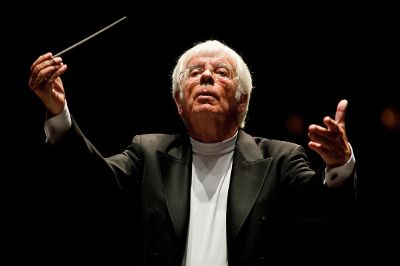This will not be a long piece. It is, however, an acknowledgement and paean to a musical soul.
This weekend I have the distinguished honor of once again playing with one of those elder statesmen of music, Helmuth Rilling, born in Germany in 1933. The first time I played for him I was truly too young to appreciate what was being said by him in our rehearsals in Stuttgart for a festival of the music of J.S. Bach. On the menu was the great Mass in B Minor and it was the summer of 1979. It was very overwhelming being in a foreign land for the first time, experiencing a language with which I had limited experience. Nonetheless, this man of modest physical presence struck a chord with me even though I knew next-to-nothing about him or his reputation.
The rehearsals were mostly in German, as his soloists and choristers were Germans or German-speakers. The kid on first trumpet from El Barrio was not. It wasn’t necessary, at any rate, to speak his verbal language in order to find what it was that he wanted his American trumpet section to do.
His movements varied, in those days, from the very flowing to stiffer gestures. Now, all decent conductors should be able to do that. However, with Helmut it was about his face as it accompanied those gestures. His face tells the story the audience does not receive by virtue of only seeing his back in performance.
He is of that small group of choral conductors that takes each and every word of text to heart. He has studied those words and examined how the world’s greatest composers have combined the subtleties of orchestration to truly tell a story. If we don’t acknowledge that a choral piece tells a story , then, we are missing the point. The Christmas Oratorio of Bach which we are set to perform with him is not a mere set of songs and choruses for their own sake. They tell a narrative of something important to a great segment of the world’s population and, as I sit quietly during the movements in which the trumpets are not included, the kindness and the alternating fire in this octogenarian’s face tell me all I need to know: he loves the music and he wants me, the performer/listener to love it, as well.
He is not given to wild motions. He does merely what he feels he needs to do to get his ideas across. Those moments where his eyes open in an amazed beckoning of the heart compels us, his simultaneous translators, to join with him to tell the story. He is truly a conduit for the music.
I am unabashedly envious of those close enough to Rilling to have been able to study with him. I can’t imagine what an hour-long conversation with him about musical beauty would be like. I wouldn’t be able to take that quiet intensity for very long. I can say that the musicians that love to work for him, nay, with him do so with a strong desire to get it right. Yes, that places a bit more strain on the player but, my God… what a reward it is to play for a gentleman who wants to get it right for Bach.


Yes. Double bar.
LikeLike
I was thinking along the lines of “wunderbar”. 🙂
LikeLike
I also played under Helmuth Rilling several times and always loved him.
LikeLike
Thanks very much for your homage to a great conductor. Helmut has always been about finding the composer’s intent through his complete mastery of the score, knowledge of performance practice and style, and humility before music.
René Clausen
Conductor, The Concordia Choir
LikeLike
I couldn’t have said it better and more succinctly than you, René. In fact, I didn’t, which makes you the better writer.
LikeLike